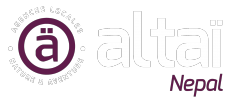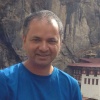Ascension Mera Peak
Itinerary
-
Day 1 Arrival in Kathmandu
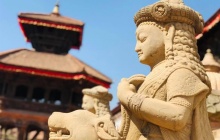 Arrival at the Kathmandu International Airport. Welcome by Altaï Nepal team and transfer you to our hotel. Dinner together with our trip leader, who will give you some important information on the adventure ahead.
Arrival at the Kathmandu International Airport. Welcome by Altaï Nepal team and transfer you to our hotel. Dinner together with our trip leader, who will give you some important information on the adventure ahead.
Accomodation: Hotel
-
Day 2 Drive Kathmandu Ramechap. Flight Ramechap - Lukla. Trek to Paiya (2850m)
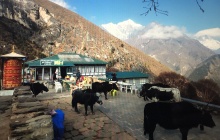 If leaving for Ramechap on the same day as your flight, depart by night shuttle at 03: 00 am for Ramechhap Airport, 4-5 hrs drive. The early morning flight from Ramechhap to Lukla offers spectacular panoramic views of the eastern Himalayas; Langtang, Gauri, Shanker, Numbur, Manglungtse, and finally Everest... It is a lovely 30 min flight to Lukla (2700 m), where Sherpas are waiting for us with specialist equipment. It’s indeed a breathtaking landing amid towering mountains. Here, we meet our trailhead towards Paiya, starting with a descent to Surke, where we cross a river before climbing to Chhutok Pass. A beautiful trail with a few up and down section leads us to Paiya.
If leaving for Ramechap on the same day as your flight, depart by night shuttle at 03: 00 am for Ramechhap Airport, 4-5 hrs drive. The early morning flight from Ramechhap to Lukla offers spectacular panoramic views of the eastern Himalayas; Langtang, Gauri, Shanker, Numbur, Manglungtse, and finally Everest... It is a lovely 30 min flight to Lukla (2700 m), where Sherpas are waiting for us with specialist equipment. It’s indeed a breathtaking landing amid towering mountains. Here, we meet our trailhead towards Paiya, starting with a descent to Surke, where we cross a river before climbing to Chhutok Pass. A beautiful trail with a few up and down section leads us to Paiya.
Drive: 4 hours
Flight: 30 Mins
Trek: 3 hours
Ascent: 1430 m
Descent: 85m
Accommodation: Lodge -
Day 3 Paiya - Panggom (2940m)
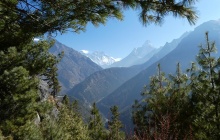 We start the day with an easy descent, through hillsides rich in agriculture, until Paiya river. We trek through a forest for quite a while before a steep climb to Khari Pass, a viewpoint offering fabulous views of several mountains exceeding 7000m. After a descent through rhododendron forests, e continue our walk along flat trail all the way up to the village of Panggom.
We start the day with an easy descent, through hillsides rich in agriculture, until Paiya river. We trek through a forest for quite a while before a steep climb to Khari Pass, a viewpoint offering fabulous views of several mountains exceeding 7000m. After a descent through rhododendron forests, e continue our walk along flat trail all the way up to the village of Panggom.
Trek: 7 - 8 hours
Ascent: 115 m
Accomodation: Lodge -
Day 4 Pangomm - Ramailo Danda (2950m)
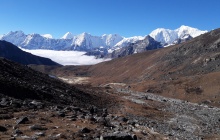 Today, we come across beautiful Sherpa villages on the way, mostly climbing down, before we reach the Panggom Pass at 3220m: enjoy an enchanting view on the Mera Peak. Continue to trek through cultivated land, exchanging few smiles with local villagers and farmers. It’s a flat trail most of the time, but there is a steep ascent before reaching Ramailo Dada (literally, fun hill!), where we spend the night.
Today, we come across beautiful Sherpa villages on the way, mostly climbing down, before we reach the Panggom Pass at 3220m: enjoy an enchanting view on the Mera Peak. Continue to trek through cultivated land, exchanging few smiles with local villagers and farmers. It’s a flat trail most of the time, but there is a steep ascent before reaching Ramailo Dada (literally, fun hill!), where we spend the night.
Trek: 7 hours
Ascent: 80 m
Accomodation: Lodge -
Day 5 Ramailo Danda - Chhetra Khola (3345m)
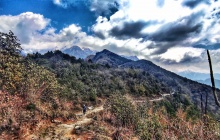 It’s a beautiful ‘picnic’ day (we carry our lunch with us), in that we do most of the walk in forests, with no settlements or local teahouses available for lunch. The trail rises progressively with many zig-zag, through the forest of bamboo and rhododendron, then descends to the Tama River, a serene area to eat our lunch. We continue our trek through the forest to Chhetra Khola.
It’s a beautiful ‘picnic’ day (we carry our lunch with us), in that we do most of the walk in forests, with no settlements or local teahouses available for lunch. The trail rises progressively with many zig-zag, through the forest of bamboo and rhododendron, then descends to the Tama River, a serene area to eat our lunch. We continue our trek through the forest to Chhetra Khola.
Trek: 8 hours
Ascent: 400 m
Accommodation: Lodge -
Day 6 Chhetra Khola - Kothe (3690m)
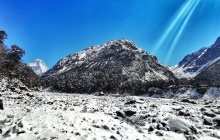 Our trekking continues through the forest until Tokthok village, where we see larger settlements like Tashing Ongma. We climb down and meet the Inkhu Khola (Torrent) at Mausam Kharka. We continue to skirt the river before reaching the charming village of Khote: we have entered the Makalu Barun National Park. Now, the views of Mera Peak are already amazing!
Our trekking continues through the forest until Tokthok village, where we see larger settlements like Tashing Ongma. We climb down and meet the Inkhu Khola (Torrent) at Mausam Kharka. We continue to skirt the river before reaching the charming village of Khote: we have entered the Makalu Barun National Park. Now, the views of Mera Peak are already amazing!
Trek: 8 hours
Ascent: 330 m
Accomodation: Lodge -
Day 7 Khothe - Thagnag (4260m)
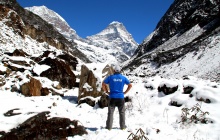 After breakfast at this wonderful place, our day begins with a walk along the bank of a river fed from the melting snow and springs in the surrounding mountains. Cross a forest, and towering peaks on both sides emerge magically, when we reach an open valley. More peaks will thrill us as we gently approach Tagnak village, where we stay overnight. Here, the route up toward the Mera s also visible.
After breakfast at this wonderful place, our day begins with a walk along the bank of a river fed from the melting snow and springs in the surrounding mountains. Cross a forest, and towering peaks on both sides emerge magically, when we reach an open valley. More peaks will thrill us as we gently approach Tagnak village, where we stay overnight. Here, the route up toward the Mera s also visible.
Trek: 6 - 7 hours
Ascent: 572 m
Accomodation: Lodge -
Day 8 Thagnag - Khare (4990m)
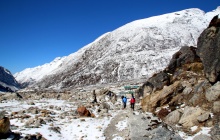 To begin the day, it’s a walk alongside the Dig Tsho glacier, and it is a relatively relaxed walk. We trek through an enchanting valley, with views both on the Hinkhu Glacier and several peaks around. We climb up a steep section to reach the village of Khare, where we spend the night.
To begin the day, it’s a walk alongside the Dig Tsho glacier, and it is a relatively relaxed walk. We trek through an enchanting valley, with views both on the Hinkhu Glacier and several peaks around. We climb up a steep section to reach the village of Khare, where we spend the night.
Trek: 5 - 6 hours
Ascent: 745 m
Accomodation: Lodge -
Day 9 Acclimatization day in Khare
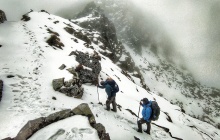 Today is a key day for acclimatisation: we try to gain as much height as we can to prepare ourselves better for the Mera Peak climb, climbing the slopes around Khare. After lunch too, we can head up the slopes to further acclimatize ourselves.
Today is a key day for acclimatisation: we try to gain as much height as we can to prepare ourselves better for the Mera Peak climb, climbing the slopes around Khare. After lunch too, we can head up the slopes to further acclimatize ourselves.
Trek: 6 - 7 hours
Ascent/Descent: As per guide's advice
Accomodation: Lodge -
Day 10 Khare - Mera La (5410m) - High Camp (5810m)
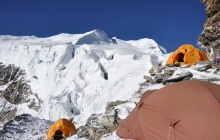 Today, we follow a glacier - crampons on - keeping close to zones where there are no crevasses. We climb up a steep trail towards the base camp of Mera Peak, then we continue through Mera La and reach High Camp. We set up our camp at this spectacular setting, while enjoying splendid views of Mt. Everest, Mt. Makalu, Mt. Cho Oyu a s we ass several other peaks:Lhotse, Nuptse, Chamlang and Baruntse. Overnight at Mera High Camp.
Today, we follow a glacier - crampons on - keeping close to zones where there are no crevasses. We climb up a steep trail towards the base camp of Mera Peak, then we continue through Mera La and reach High Camp. We set up our camp at this spectacular setting, while enjoying splendid views of Mt. Everest, Mt. Makalu, Mt. Cho Oyu a s we ass several other peaks:Lhotse, Nuptse, Chamlang and Baruntse. Overnight at Mera High Camp.
Trek: 6 - 7 hours
Ascent: 865 m
Accomodation: Camping -
Day 11 Ascent of Mera Peak (6476m)
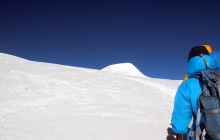 ASCENT OF MERA PEAK :: Our team will wake you up quite early: at about 2am (or even earlier, depending on the group size). Sip some hot tea along with a high energy meal to start our ascent of Mera Peak. We cross the main glacier to the south side, and approach the ridge. It’s a less technical route but the slopes are still challenging, before we are on the level summit ridge. When we reach the foot of the final ascent, we are attached to a fixed rope laid by your guide and use our ice axe and a jumar to climb and reach Mera Peak Summit. It’s a breath-taking, spectacular panorama in front of us, with clear views of the highest mountain of the world: Mt. Everest. Drink in the magical views and congratulate yourself! Now, time to climb down to Khare for a celebration…
ASCENT OF MERA PEAK :: Our team will wake you up quite early: at about 2am (or even earlier, depending on the group size). Sip some hot tea along with a high energy meal to start our ascent of Mera Peak. We cross the main glacier to the south side, and approach the ridge. It’s a less technical route but the slopes are still challenging, before we are on the level summit ridge. When we reach the foot of the final ascent, we are attached to a fixed rope laid by your guide and use our ice axe and a jumar to climb and reach Mera Peak Summit. It’s a breath-taking, spectacular panorama in front of us, with clear views of the highest mountain of the world: Mt. Everest. Drink in the magical views and congratulate yourself! Now, time to climb down to Khare for a celebration…
Climbing time: 10 - 12 hours
Ascent: 676 m
Descent: 1491 m
Accomodation: Camping -
Day 12 Contingency day
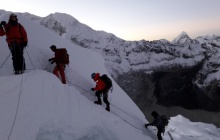 It's a contingency day in case of poor weather, etc.
It's a contingency day in case of poor weather, etc.
Accomodation: Camping
-
Day 13 Khare - Kothe (3690m)
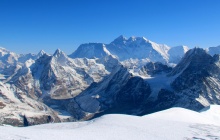 It’s the same trail (used previously) that takes us back to Kothe. It’s time for more celebration: we keep trying out local delicacies and raksi (local wine).
It’s the same trail (used previously) that takes us back to Kothe. It’s time for more celebration: we keep trying out local delicacies and raksi (local wine).
Trek: 5h
Accomodation: Lodge
Descent: 1355m -
Day 14 Kothe - Thuli Kharka (4295m)
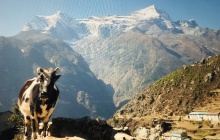 After breakfast, we start our trek to Thuli Kharka, and it’s a “climb up and descend” day. Along the trail, we cross several small torrents before reaching Taktho. We see a couple of Chortens. It’s sometimes a steep, downward walk. We climb up a trail to Thuli Kharka.
After breakfast, we start our trek to Thuli Kharka, and it’s a “climb up and descend” day. Along the trail, we cross several small torrents before reaching Taktho. We see a couple of Chortens. It’s sometimes a steep, downward walk. We climb up a trail to Thuli Kharka.
Trek: 5h - 6h
Ascent: 610m
Descent: 300m
Accommodation: Lodge -
Day 15 Thuli Kharka - Zwatrawala - Lukla (2800m)
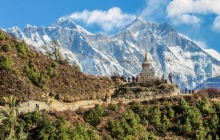 Today, we walk along a trail full of rises and high plateaux all the way up to Zatrwa La Pass at 4665m. Enjoy once again the view on the Hinku wilderness as well as the south face of the Mera Peak. At first a gentle then steep descent from the Kalo Himal towards the Dudh Koshi valley takes us back to Lukla.
Today, we walk along a trail full of rises and high plateaux all the way up to Zatrwa La Pass at 4665m. Enjoy once again the view on the Hinku wilderness as well as the south face of the Mera Peak. At first a gentle then steep descent from the Kalo Himal towards the Dudh Koshi valley takes us back to Lukla.
Trek: 7 - 8 hours
Ascent: 510 m
Descent: 1860 m
Accommodation: Lodge -
Day 16 Flight Lukla - Ramechap and drive back to Kathmandu
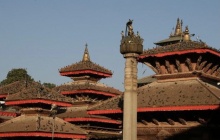 This morning, we catch a flight to Ramechhap and drive to Kathmandu. In clear weather, the views of the Himalayan mountains are spectacular. We stop for lunch on the way. We visit Bhaktapur on the way, a sumptuous pedestrian city located 15 km from Kathmandu ... the most beautiful of the three imperial cities of the valley Transfer to the hotel.
This morning, we catch a flight to Ramechhap and drive to Kathmandu. In clear weather, the views of the Himalayan mountains are spectacular. We stop for lunch on the way. We visit Bhaktapur on the way, a sumptuous pedestrian city located 15 km from Kathmandu ... the most beautiful of the three imperial cities of the valley Transfer to the hotel.
Flight: 30 m
Drive: 4 hours
Accommodation: Hotel -
Day 17 Free day in Kathmandu
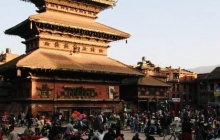 Free day in Kathmandu
Free day in Kathmandu
-
Day 18 End of the trip
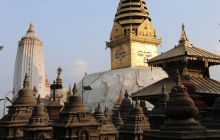 End of our services. International return flight.
End of our services. International return flight.
Dates & prices
International departures:
No departure for now
Trip code: NEPMERA-EN
Included
- All in-country transfers as detailed in itinerary
- 3 * hotel and B&B accommodation in Kathmandu (Hotel Tibet, Manaslu or similar)
- Trek includes full-board in lodging
- Domestic flights: Kathmandu - Lukla - Kathmandu
- Full accompaniment by an English speaking Altaï Guide
- Visits as per itinerary: with a cultural guide by private vehicle
- Luggage transfers: up to 12kg maximum per person during the trek
- Trekking support team: assistants and porters
- Trekking permits: Sagarmatha National Park and Rural Municipal
- Staff Insurance
Not included
- Entrance to historical sites & monuments
- Meals in Kathmandu & Kathmandu Valley, as detailed in itinerary
- Nepalese visa: US $ 25 + photos
- International flights
- Island Peak Ascent permit: 505 € / person (includes ascent permit, specialist climbing guide, staff insurance: helicopter, hospitalization)
- Island Peak Ascent permit in Spring: 115 € / person
- Drinks, tips and personal expenses - all that is not in "THE PRICE INCLUDES"
Notes
Level 5/5
Terms and conditions
Inscription
Facturation
Annulation
- Cancellation received more than 30 days prior to the departure date: a sum of €50 per person will be retained
- Cancellation received 30 to 21 days before the departure date: your deposit, 30% of the total trip price will be retained
- Cancellation received 20 to 14 days before the departure date: 50% of the total trip price will be retained
- Cancellation received 13 to 7 days before the departure date: 75% of the total trip price will be retained
- Cancellation received less than 7 days before the departure date: 100% of the total trip price will be retained
- Fixed airfares: if your airline ticket was issued in advance, often done to avoid significant surcharges, you will be charged 100% of any non-refundable fees if you wish to change or cancel your flight plan.
- Fixed in-country costs: early charges for firm bookings will be charged if you cancel or modify your trip.
- Insurance costs: if you have taken out comprehensive or cancellation insurance, the cost of insurance is due and cannot be refunded.
Modification du contrat
Prix et révision des prix
Cession du contrat
Insurance
Practical info
Staff
Food
Accommodation
Transportation
Budget & exchange
Tips
Vital equipment
- Warm Sleeping Bag
- Water purifiers (micropur, aguatabs ...)
- A cap or sunhat
- 1 or 2 sets of thermals: long-sleeved thermal tops and full-length long johns
- Long sleeved and short sleeved t-shirts, preferably in quick-drying technical material
- A light fleece or equivilent (plus extra warm layers if necessary)
- A breathable wind proof, waterproof jacket (Gore-Tex...)
- Lightweight waterproof over trousers
- Suitable shorts
- Walking trousers
- A pair of high-rise walking boots - strength, good grip of the foot and ankle (high stems) and impermeability are essential. Choose shoes with non-slip soles (vibram).
- A pair of trainers/sandels or equivilent casual shoes for cities, villages and evenings
- Thick walking socks
- Warm gloves, hat and scarf (it can be chilly in the mountains)
- Your personal toiletries and a fast drying towel
- Water bottle(s). Min. 2 litres, light and isothermal
- A good pair of sunglasses (think min. category 3)
- Sun-cream, face and lips
- Head torch and spare batteries
- A pocket knife
- A pair of hiking poles
- A waterproof bag cover (or plastic bags) to protect your belongings
- Toilet paper
- Anti-bacterial hand gel
- Your camera
- Notebook or travel diary
- A pair of mountain hiking boots for wearing with crampong (B2 or B3)
- Gaitors
- Crampons
- A harness
- A descender or figure of 8
- 2 locking carabiners (for use with gloves, think pear shaped)
- A self-locking Jumar
- A 8mm rope, 1.5 or 2m
- An ice-axe
- A helmet
- A survival blanket
Material
- No cotton
- Always carry dry spares of everything, including underwear and gloves
- A warm breathable base layer
- A second thermal layer
- Wind and water proof protective outer layers
Luggage
- A rucksack (35-40L or 45-50L) for use as a day bag. This will contain your (vital) personal belongings for the day (sweater, spare t-shirt, water bottle, picnic-lunch, sunglasses, small things ... )
- We use porters to transport our other belongings when trekking. Please bring a flexible travel bag with zips for easy access max 80L and max 13kg (16kg with camping gear). Please do not bring suitcases or other hard bags which the porters cannot transport.
- You may also be able to store some belongings securely at the hotel in Kathmandu.

